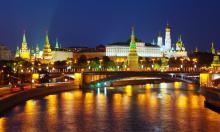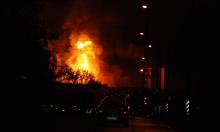Terrorists attack India's Bombay with seven explosions
Seven explosions ripped through Bombay's commuter train during Tuesday evening rush hour. About 100 people have been killed in the blasts, police said. India's major cities were put on high alert after the blasts, which authorities characterized as an attack.
There was chaos throughout Bombay's crowded rail network following the explosions, and authorities struggled to determine how many people had been killed and injured.
Bombay Police Chief A.N. Roy said on Indian television that an estimated 100 people were killed and more than 250 were injured.
"We are busy in the rescue operation. Our first priority is to rescue the injured people," he said. However, heavy monsoon downpours were hampering the effort.
Police were also reportedly carrying out raids across the country following the explosions, presumably in search of suspects. One television report said a suspect was in custody.
A senior Bombay police official, P.S. Pasricha, said the explosions were part of a well-coordinated attack. The country's home minister told Indian television that authorities had information that an attack was coming but did not know the time or place, the AP reports.
Witnesses reported seeing body parts strewn about stations, and Indian television news channels broadcast footage of bystanders carrying victims to ambulances and searching through the wreckage for survivors and bodies. Some of the injured were seen frantically dialing their cell phones.
The force of the blasts ripped doors and windows off carriages, and luggage and debris were strewn about, splattered with blood. Survivors were seen clutching bloody bandages to their heads and faces. Some were able to get up and walk from the station on their own.
Pranay Prabhakar, the spokesman for the Western Railway, confirmed that seven blasts had taken place. He said all trains had been suspended in Bombay, and he appealed to the public to stay away from the train stations of the city of 16 million, India's financial and commercial center and principal port on the Arabian sea.
There was no immediate claim of responsibility for what appeared to be bombings, but the blasts came in quick succession - a common tactic employed by Kashmiri militants that have repeatedly targeted India's cities.
The first explosion hit the train at a railway station in the northwestern suburb of Khar, said a police officer who spoke on the condition of anonymity because he was not authorized to talk to the media.
India's CNN-IBN television news, which had a reporter traveling on the train, said the blast took place in a first-class car as the train was moving, ripping through the compartment and killing more than a dozen people
The Press Trust of India, citing railway officials, said all the blasts had hit first-class cars.
All of India's major cities were reportedly on high alert following the attacks, which came hours after a series of grenade attacks by Islamic extremists killed eight people in the main city of India's part of Kashmir.
Kashmir was divided between India and Pakistan in war after they gained independence from Britain in 1947, and they fought another full-scale conflict over the region in 1965.
Dozens of militant groups have been fighting Indian rule in Kashmir, demanding the mostly Muslim region's independence, or its merger with Pakistan.
India accuses Pakistan of aiding the militants, who run training camps on Pakistan's of Kashmir. Pakistan denies the charge.
After coming close to fighting a fourth war in 2002, Pakistan and India embarked on a peace process aimed at resolving their differences, including their conflicting claims to all of Jammu-Kashmir.
Subscribe to Pravda.Ru Telegram channel, Facebook, RSS!




